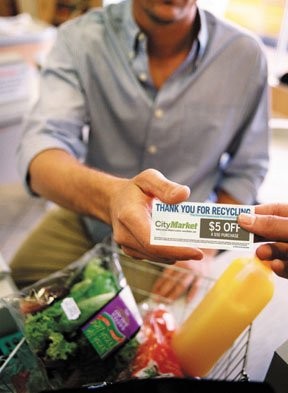RecycleBank sets its sights on Toronto

RecycleBank’s rewards-for-recycling program may soon be coming to Canada’s biggest city. In June, Toronto mayoral candidate George Smitherman announced his support of RecycleBank at a policy speech given at the Empire Club of Canada, calling it an innovative program and “a quadruple win” – benefiting the environment, residents, local businesses and the city.
According to RecycleBank, their program rewards residents for recycling, saves cities money from landfill disposal costs, provides a direct economic stimulus to local businesses and helps to save natural resources. For Toronto, Smitherman says, implementation of the program would provide a huge boost to the city’s goal of accomplishing 70 percent landfill diversion rate. RecycleBank says their programs have been a success in the United States and the United Kingdom, and it looks as though Canada is the next big step.
As a global company headquartered in New York City, with offices in Canada and the UK, RecycleBank’s program is designed to motivate people to take greener actions, like recycling, by rewarding them with points which are redeemable at local and national retailers.
The company has already proven a major success across more than 300 communities in the U.S. and U.K. In fact, London Mayor Boris Johnson has come out in favour of bringing RecycleBank to his city following the achievements seen in the Royal Boroughs of Windsor and Maidenhead. The two boroughs delivered a 35 percent increase in recycling rates in trial areas, and in June went borough-wide with the program. UK environment secretary Caroline Spelman told The Guardian newspaper that other local councils should follow suit.
In the U.S., RecycleBank has helped Miami and a suburb of Hollywood increase recycling by 130 percent, saving the latter more than $119,000 in landfill costs and commodity revenue – in the first two months. In Houston, Texas, a pilot program of 20,000 households who received larger recycling containers, similar to Toronto’s blue bins, more than doubled the amount they recycle, keeping 3.3 million fewer pounds of waste out of the landfill in just four months. At the six month mark, Houston expanded the program to more than 75,000 homes and plans to continue to bring it to more neighbourhoods.
Atul Nanda, president of RecycleBank’s Canadian Division, looks forward to RecycleBank potentially launching in his hometown.
“My first job out of university was as assistant manager of Toronto’s recycling program, helping the city increase recycling rates and market the materials collected in the blue box program to end markets,” Nanda said. “I believe that RecycleBank can increase Toronto’s recycling rates, and maintain that increase as well. Time and time again we’ve proven that RecycleBank is a creative and impactful environmental solution for cities.”
RecycleBank takes the carrot – rather than the stick – approach to the recycling process. The company works to encourage recycling participation through incentives.
Earlier this year in England, Eton and Castle Ward Councillor Liam Maxwell came out against the so called ‘bin tax’ (in which citizens are charged fees for the amount they throw out) and told the BBC that offering incentives for recycling works better.
“It increases recycling rates, reduces our environmental impact, reduces council tax and helps local businesses,” he said. “The results of our trial with 6,000 local homes [in Windsor and Maidenhead] far exceeded our expectations.”
If elected (Toronto’s next municipal election is this October) Smitherman says he hopes to bring RecycleBank to Toronto. The City’s blue bins are already outfitted with equipment that works with RecycleBank technology, and implementing this program would make Toronto the first city in Canada to partner with RecycleBank.
How does RecycleBank work? It’s simple – RecycleBank is rewards for recycling. Residents recycle, RecycleBank rewards them with points based on the amount recycled, and then they can go “shopping” for products of their choice. On pick-up days, trucks retrofitted with RecycleBank technology identify the blue bin at pick-up. The weight of recyclables is converted into RecycleBank Points, which are then deposited into a household’s personal RecycleBank.com account. The more a household recycles, the more points they receive.
Redeeming RecycleBank Points is just like shopping online with more than 20 categories to choose from, including food and grocery, sports and recreation, entertainment, restaurants, health and beauty and more. Points can be redeemed for rewards in the form of groceries, gift cards, unique discounts, apparel, school supplies, food, home goods and others. Members can also track their individual environmental footprint by seeing how many litres of oil and how many trees their household has saved as a result of their recycling efforts. Nanda thinks that a partnership will help Toronto in its aim to divert 70 percent of its waste.
“RecycleBank will help Toronto increase and sustain recycling rates,” he said. “Rewards for recycling works. We’ve seen it in the U.S. We’ve seen it in the U.K. We will see it in Canada.”
Nanda added that RecycleBank, with its technology, can help Toronto with data management on recycling participation, set out rates and incremental recycling weights as well.
“This is data the city could never have before. This is valuable in helping the city understand how much residents are recycling, in helping to identify educational needs down to the route level, and what motivates residents to recycle.”
Since 2005, more than 300 communities across the United States and the United Kingdom have joined RecycleBank and recycled more than 284,291 tonnes of material, helping to save close to 131 million litres of oil, and 4.2 million trees. RecycleBank’s programs have also led to a reduction of 866,811 metric tonnes in carbon emissions. The company has been recognized with a number of business and environmental awards, including being named as a Technology Pioneer by the World Economic Forum and as a Champion of the Earth by the United Nations Environmental Programme.
RecycleBank

